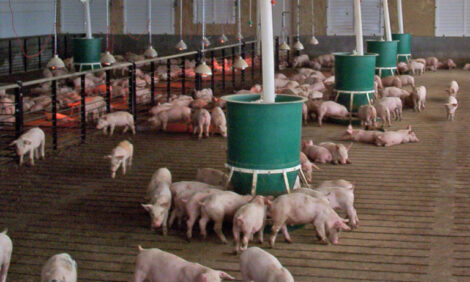



Dietary Tryptophan Supplementation with Reduced Large Neutral Amino Acids Enhances Feed Efficiency and Decreases Stress Hormone Secretion in Nursery Pigs
Reducing large neutral amino acids in the diet of nursery pigs boosted the positive effect of L-tryptophan on the stress response when the animals were mixed, report scientists from North Carolina State University.In a paper published recently in Journal of Nutrition, Yan Bin Shen and colleagues at North Carolina State University explain that tryptophan (Trp), the rate-limiting substrate of serotonin (5-hydroxytryptoamine; 5-HT) synthesis in the brain, competes with large neutral amino acids (LNAA) to cross the blood-brain barrier.
They carried out a study was designed to evaluate the effect of L-tryptophan supplementation on nursery pigs experiencing social-mixing stress and fed diets varying in LNAA concentrations.
Forty-eight individually housed barrows at six weeks of age were randomly allotted to four dietary treatments based on a 2×2 factorial arrangement, with L-tryptophan supplementation (0 or 0.6 per cent) and LNAA concentrations (4.5 or 3.8 per cent) as the two main factors. Pigs were fed the diets for seven days.
On day 4, pigs within a treatment were paired in a new pen to create social-mixing stress and behaviour was recorded for 24 hours. Body weight was measured on days 0, 4, 5, and 7. Saliva and blood were collected on days 4 and 7. On day 7, pigs were killed to obtain hypothalami.
During the entire period excluding the mixing day (day 5), L-tryptophan supplementation improved (P<0.01) feed efficiency of pigs and lowering the LNAA further enhanced (P<0.05) the effects of L-tryptophan.
Supplementation of 0.6 per cent L-tryptophan increased (P<0.001) hypothalamic 5-HT and 5-hydroxyindoleacetic acid.
The salivary cortisol concentration was reduced (P<0.05) by lowering the LNAA.
Collectively, lowering the LNAA further enhanced the improvement of feed efficiency by L-tryptophan supplementation of nursery pigs under social-mixing stress in association with reduced stress hormones, concluded the Raleigh-based researchers. They added that this indicates reducing LNAA in the diet can facilitate the effect of L-tryptophan on the stress response of pigs.
Reference
Shen Y.B., G. Voilqué, J. Odle, and S.W. Kim. 2012. Dietary L-tryptophan supplementation with reduced large neutral amino acids enhances feed efficiency and decreases stress hormone secretion in nursery pigs under social-mixing stress. J. Nutr. 142 (8):1540-1546. doi: 10.3945/?jn.112.163824
Further ReadingYou can view the full report (fee payable) by clicking here. |
November 2012








